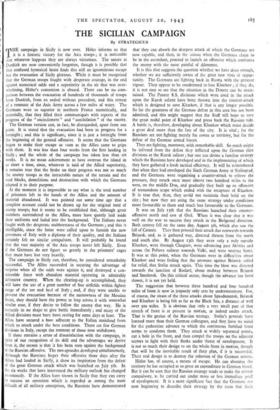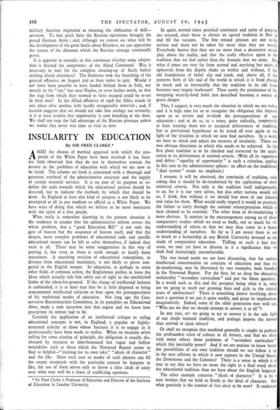THE SICILIAN CAMPAIGN
By STRATEGICUS The German version can, in fact, be disregarded, apart from one point. It is stated that the evacuation had been in progress for a fortnight ; and this is significant, since it is just a fortnight from the beginning of the general offensive. It seems that the Germans began to make their escape as soon as the Allies came to grips with them. It was less than four weeks from the first landing in Sicily ; and the whole of the campaign has taken less than six weeks. It is no mean achievement to have overrun the island in so short a time, since, whatever is laid. of the Allied superiority, it remains true that the brake on their progress was not so much the enemy troops as. the intractable nature of the terrain and the road blocks, demolitions and destruction with which the Germans adapted it to their purpose.
At the moment it is impossible to say what is the total number of prisoners left in the hands of the Allies and the amount of material abandoned. It was pointed out some• time ago • that a complete account could not be drawn up for the original total of enemy troops; but it seems to be established that, although great numbers surrendered to the Allies, more have quietly laid aside their uniforms and faded into the background. The Italians never fought with the desperate stubbornness of the Germans ; and this is intelligible, since the latter were called upon to furnish the new governors of Italy with a diploma of their quality, and the Italians certainly felt no similar compulsion. It will probably be found that the vast majority of "the Axis troops never left Sicily. Even if the Germans do not figure so greatly in the prisoners' cages they must have lost very heavily.
The campaign in Sicily can, therefore, be considered remarkably successful. The Allies succeeded' in securing the advantage of surprise when all the odds were against it, and destroyed a con- siderable force with abundant material operating in admirably defensive country. When. the clearing-up is accomplished, they will have the use of a great number of fine airfields within fighter range of the toe and heel of Italy ; and, if they were unable to prevent the evacuation because of the narrowness of the Messina Strait, they should have the power to leap across it with somewhat similar ease, if they desire to follow the enemy that way. He is certainly in no shape to give battle immediately ; and many of the Allied divisions must have been resting for some days at least. The Allies have secured a bast adjacent to the Italian mainland from which to attack under the best conditions. There are few German divisions in Italy, except the remnant of those now withdrawn.
If there remains a sense of dissatisfaction with the• campaign, in spite of nur recognition of its skill and the advantages we derive from it, the reason is that it has been seen against the background of the Russian offensive. The two episodes developed simultaneously. Although the Russians began their offensive three days after the Allies had landed in Sicily, it drew its inspiration from the defeat of the great German attack which was launched on July 5th. In the six weeks that have intervened the military outlook has changed enormously. If the Allies have shown in Sicily that they can carry to success an operation which• is regarded as among the most difficult of all military enterprises, the Russians have demonstrated that they can absorb the sharpest attack of which the Germans are now capable, and then, in the season when the Germans claim to be in the ascendant, proceed to launch an offensive which confronts the enemy with the most painful of dilemmas.
It is this that suggests the question whether we have done enough, whether we are sufficiently aware of the great new vista of opppr- tunity. The Germans axe fighting back in Russia with the greatest vigour. They appear to be condemned to lose Kharkov ; if they do, it is not easy to see that the situation in the Donetz can be main- tained. The Panzer S.S. divisions which were used in the attack upon the Kursk salient have been thrown into the counter-attack which is designed to save Kharkov, if that is any longer possible. So far the greatness of the German defeat in this area has not been admitted, and this might suggest that the Staff still hope to save the great nodal point of Kharkov and press back the Russian tide. A battle is, therefore, developing about Kharkov which must decide a great deal more than the fate of the city. It is vital ; for the Russians are not fighting merely for towns or territory, but for the defeat of the German armed forces.
They are fighting, moreover, with remarkable skill. So much might be inferred from the defeat they inflicted upon the German elite divisions at the Kursk salient ; but one can divine a familiar strategy which the Russians have developed and in the implementing of which they have gathered a fresh tactical efficiency. It will be remembered that when they had enveloped the Sixth German Army at Stalingrad; and the Germans were organising a counter-attack to relieve the pressure, they struck once more almost two hundred miles to the west, on the middle Don, and gradually they built up an offensive of tremendous scope which ended with the recapture of Kharkov. It is true that, then, they conld not maintain their hold on the city ; but now they are using the same strategy under conditions more favourable to them and much less favourable to the Germans.
It was on July t3th that the Russians launched their counter- offensive north and east of Orel. When it was clear that it was well on the way to success they struck in the Bielgorod direction. Both centres fell on the same day, August 5th, which also saw the fall of Catania. They then pressed their attack due eastwards towards Briansk, and, as it gathered. way, directed thrusts from the north and south also. By August t3th they were only a' mile outside Kharkov, were through Chuguev, were' advancing past Akhtira and across the Poltava. railway towards Valhi, and were nearing Sutr.i. It was at this point, when the Germans were in difficu'oies about Kharkov and were feeling that the pressure against Briansk called for relief, that Stalin. struck again. This time the blow was directed towards the junction of Roslavl, about midway between Briansk and Smolensk. Onothis critical sector, though the advance has bee'. slower, it is not yet held.
The suggestion that between three hundred and four hundred. miles -of fron t is now in jeopardy only errs by understatement. For, of course, the strain of the three attacks about Spasdemensk, Brian* and. Kharkov is being felt as far as the Black Sea, a distance of well .over soo miles. It is obvious that only a very small part of that stretch of front is at present in motion, or indeed under attack. That is the genius of the Russian strategy. Stalin's generals have learned more than their German colleagues, and they .have no mind for the pedestrian advance to which the continuous fortified front seems to condemn them. They attack at widely separated points, cut a hole in the front,- and then compel the troops on the adjacent sectors to fight with their flanks under threat of envelopment. It is not so much their design to set the whole front in motion, though that will be the inevitable result of their plan, if it is successful. Their real design is to destroy the cohesion of the German armies.- Hitler has, of course, a means of escape. He can abandon the territory he has occupied at so great an expenditure in German blood.
But it can be seen that the Russian strategy tends to make the retreat compulsory, to be carried out under more or less immediate peril of envelopment. It is a most significant fact that the Germans are now beginning to describe their strategy by the term that their
military theorists stigmatise as meaning the abdication of skill— attrition. To that pitch have the Russian operations brought the proud German Army ; and, although we cannot see what will be the development of the great battle about Kharkov, we can appreciate the nature of the dilemma which the Russian strategy continually poses.
It is apposite to consider in this connexion whether some adapta- tion is beyond the competence of the Allied Command. Was it necessary to wait for the complete clearing-up of Sicily before striking afresh elsewhere? The Germans took the launching of the general offensive on August 2nd as their order to quit. Would it not have been possible to have landed behind them in Italy, not merely in the " toe," but near Naples, or even farther north, so that the trap froth which they seemed to have escaped could be re-set in their rear? In the Allied offensive of 1918 the Allies struck in one place after another with hardly recognisable intervals ; and, if caution suggests that we should not take that analogy too seriously, it is at least evident that opportunity is now knocking at the door. We shall not reap the full advantage of the. Russian pressure unless we realise that never was time so vital as now.



























 Previous page
Previous page